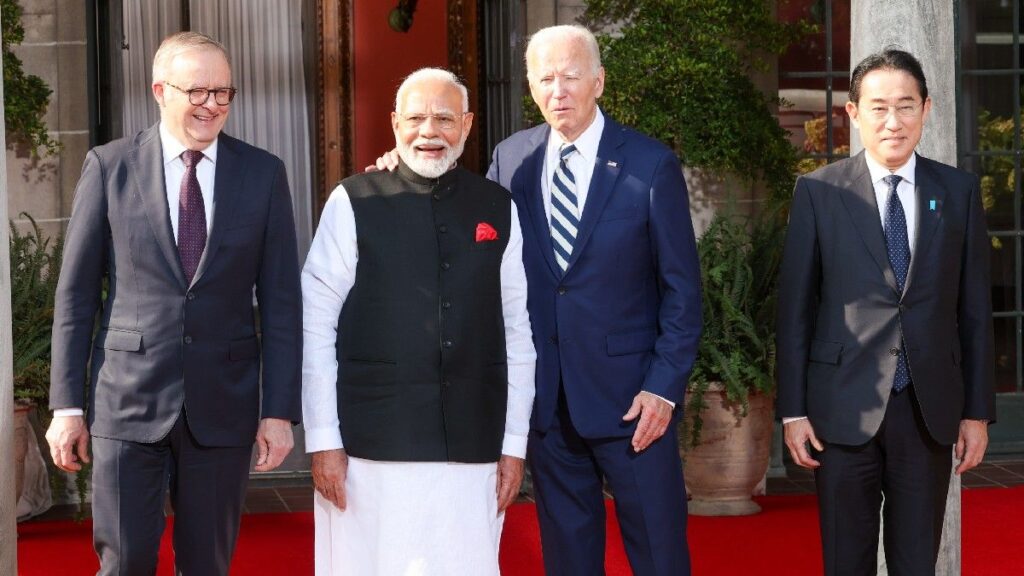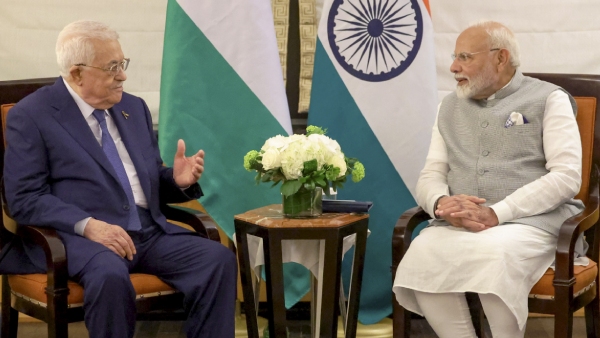Quad Wilmington Declaration 2024: Strong Message On China, Ukraine Crisis, And Gaza Conflict
In a significant geopolitical shift, the leaders of the Quad alliance-India, the United States, Australia, and Japan-issued their strongest language yet concerning China’s actions in the Indo-Pacific, while also addressing other pressing global issues.
During their summit in Wilmington, President Joe Biden, Australian Prime Minister Anthony Albanese, Japanese Prime Minister Fumio Kishida, and Indian Prime Minister Narendra Modi expressed deep concern over China’s activities in the South China Sea and laid out a firm stance on a variety of global conflicts, including Ukraine and Gaza.

Strong Language on China’s Indo-Pacific Activities
The Wilmington Declaration, issued after the Quad leaders’ meeting in Biden’s hometown, addressed China’s aggressive manoeuvres in the South and East China Seas without explicitly naming the nation. It expressed serious concerns over the “militarization” of disputed features and “coercive and intimidating manoeuvres” in these maritime regions. The group condemned actions involving coast guard and maritime militia vessels, specifically criticizing dangerous tactics used against neighbouring nations, particularly the Philippines.
A comparison between the Wilmington Declaration and the Hiroshima Declaration from May 2023 reveals a notable shift toward more assertive language. The Quad partners emphasized the importance of resolving maritime disputes peacefully and in accordance with international law, notably the United Nations Convention on the Law of the Sea (UNCLOS), a legal framework consistently rejected by China. The Quad reaffirmed that the 2016 Arbitral Tribunal ruling in favour of the Philippines against China in the South China Sea was a “significant milestone” in peacefully resolving such disputes.
Ukraine: Call for Lasting Peace
The Quad also addressed the ongoing war in Ukraine, reiterating its collective commitment to the principles of territorial integrity and sovereignty, core tenets of the United Nations Charter. The declaration condemned the war’s humanitarian consequences and reiterated the need for a “comprehensive, just, and lasting peace” in accordance with international law. In a subtle but significant gesture, the document acknowledged Prime Minister Modi’s visit to Kyiv, underscoring the active diplomatic engagement by Quad members in the Ukraine conflict.
The Quad also condemned any threat or use of nuclear weapons, urging all states to refrain from actions that undermine the territorial integrity and sovereignty of nations. The war’s ripple effects on global food and energy security were highlighted, with the Quad stressing the need for sustained efforts to mitigate these impacts.
Focus on Gaza and West Asia
In a notable departure from the Hiroshima summit, the Wilmington Declaration gave significant attention to the conflict in West Asia, particularly the Gaza crisis. The Quad unequivocally condemned the October 7 terrorist attacks, while also decrying the large-scale loss of civilian lives and the ongoing humanitarian crisis in Gaza. The leaders emphasized the need for a ceasefire and the release of hostages held by Hamas, urging international collaboration to secure an immediate resolution.
The declaration welcomed the recent United Nations Security Council Resolution S/RES/2735, which calls for an immediate ceasefire and lays out a three-stage plan to address the humanitarian crisis in Gaza. The Quad partners urged compliance with international law, including humanitarian law, and called for the protection of civilian lives and the rapid delivery of life-saving aid to Gaza.
The leaders also expressed their commitment to the two-state solution, calling for the establishment of a sovereign, viable, and independent Palestinian state while addressing Israel’s legitimate security concerns. The declaration strongly condemned actions, including the expansion of Israeli settlements and violent extremism on all sides, that undermine the prospects of a peaceful solution.
Broader Geopolitical Concerns
The Quad also addressed other global flashpoints, including Yemen and Myanmar, reflecting the group’s growing focus on geopolitical stability beyond the Indo-Pacific. The declaration condemned Houthi-led attacks on commercial vessels in the Red Sea and Gulf of Aden, emphasizing that these actions destabilize the region and threaten maritime safety.
A Unified Front
The Wilmington Declaration marks a new chapter in the Quad’s evolving stance on global issues, reflecting stronger alignment on key concerns, particularly China’s growing assertiveness in the Indo-Pacific and the humanitarian crises unfolding in Ukraine and Gaza. The Quad partners, while maintaining their unique bilateral relationships with the conflict’s main players, appear unified in their commitment to international law, peace, and humanitarian relief.
By using firmer language, the Quad has sent a clear message about its priorities and strategic approach in the face of global turbulence, reinforcing its commitment to a rules-based international order.





